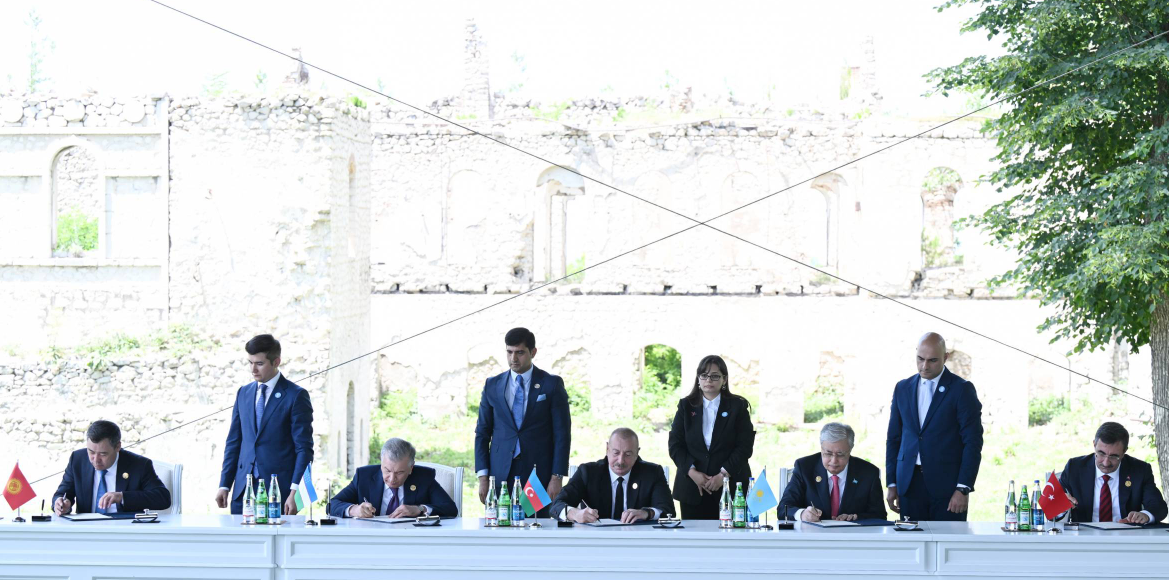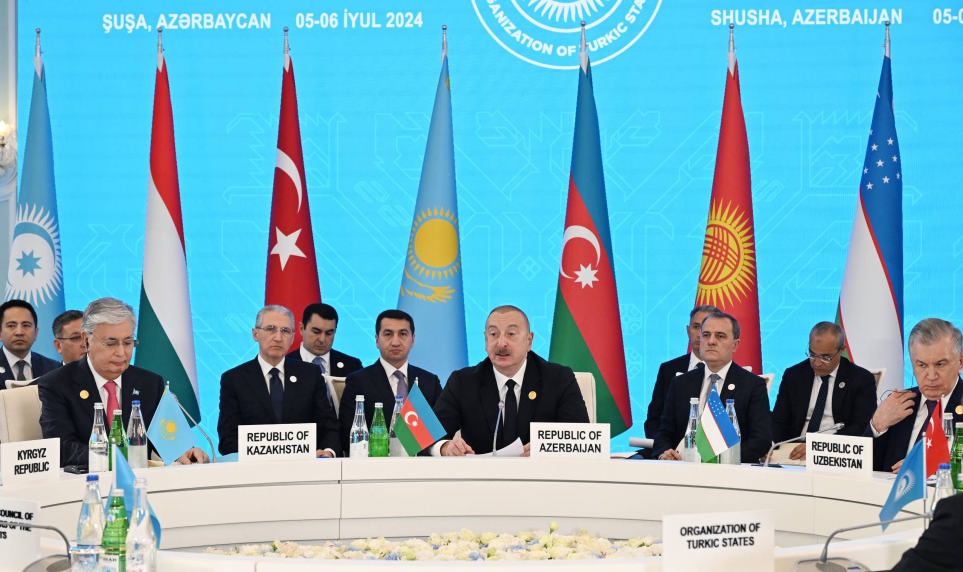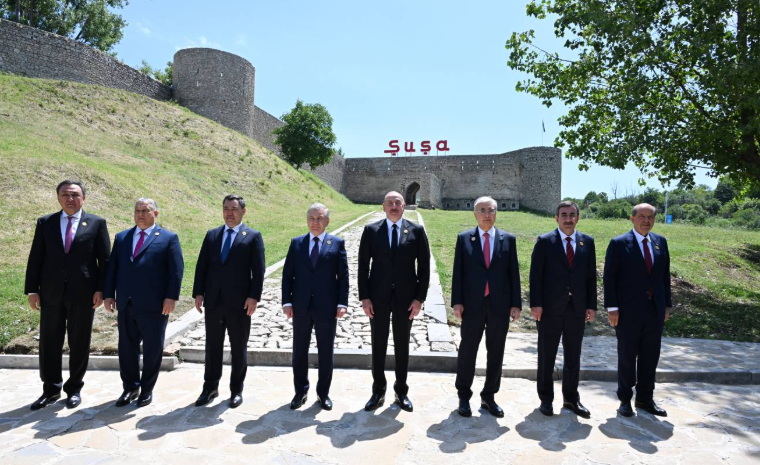The Karabakh Declaration, signed at the Informal Summit of the Organization of Turkic States (OTS) in Shusha on July 6, 2024, marks a significant step towards deepening political, economic, and cultural ties among Turkic states. Hosted by President Ilham Aliyev of Azerbaijan, the summit brought together key leaders from Azerbaijan, Kazakhstan, Kyrgyzstan, Uzbekistan, Türkiye, and Hungary as well as Turkish Republic of Northern Cyprus, Secretary General of the OTS. The declaration emphasizes the need for closer collaboration in various sectors, particularly in transport, connectivity, and climate action. By highlighting the importance of regional infrastructure, the declaration focuses on enhancing trade, investment, and the establishment of efficient trans-regional corridors such as the Trans-Caspian International East-West Middle Corridor. This corridor is seen as essential for sustainable development and international trade. Additionally, the declaration underscores the role of Turkic states in addressing global challenges, especially climate change, and promotes the creation of climate-resilient smart cities and renewable energy cooperation. Through this declaration, the OTS member states reaffirm their commitment to a sustainable and integrated future, underscoring their shared history, values, and common goals in the geopolitical and economic landscape.
Strengthening Intra-Regional Trade and Investment
The Karabakh Declaration outlines a comprehensive plan for strengthening the collective efforts of the Turkic states in various strategic areas. It emphasizes the importance of developing efficient transport infrastructure and optimizing trans-regional trade routes, particularly focusing on the enhancement of the Trans-Caspian International East-West Middle Corridor. This initiative aims to bolster economic integration among the member states by streamlining customs procedures, embracing digitalization, and promoting public-private partnerships in transport.
The declaration also sets ambitious goals for regional cooperation in energy, including the development of renewable energy projects and interconnection of energy grids among member states. Furthermore, the document highlights the need for closer collaboration on climate action, with plans to create a Turkic Environmental Forum and a Green Digital Platform.

These initiatives aim to foster a climate-resilient future by addressing environmental challenges, developing smart cities, and integrating clean energy resources. Additionally, the declaration stresses the importance of advancing digital infrastructure, including the establishment of a shared language model for AI development and the promotion of e-government frameworks to enhance cross-border cooperation. Through these detailed plans, the Karabakh Declaration sets a clear path for the Turkic states to work together towards a prosperous, sustainable, and interconnected future.
One of the primary objectives of the Karabakh Declaration is the expansion of trade and investment flows within the OTS member states. With a combined population of over 170 million people, a total trade volume of $1.2 trillion, and a GDP of $1.5 trillion, the economic potential of the Turkic world is considerable. However, the intra-regional trade remains significantly underdeveloped, amounting to only $33 billion in 2022, which is a modest figure given the scale of the collective economies.
The declaration emphasizes the need to reduce trade barriers, improve investment environments, and foster closer economic ties. These measures are essential for unlocking the full potential of the region's market. Through the reduction of tariffs, simplification of customs procedures, and harmonization of regulations, the member states aim to enhance trade flows, reduce transaction costs, and increase the ease of doing business within the region.

In addition, the establishment of the Turkic Investment Fund (TIF) with an initial capital of $500 million is a crucial step toward enhancing investment opportunities. This fund will focus on supporting infrastructure projects, trade facilitation, and innovation initiatives, which are expected to drive economic growth across the region. The TIF will also help diversify the region’s investment portfolio and attract foreign investors by providing a stable and predictable environment for investment.
The Middle Corridor: A Strategic Economic Gateway
A central component of the Karabakh Declaration is the emphasis on the Middle Corridor, which connects China to Europe, passing through several Turkic countries. This corridor has gained significant importance in recent years, particularly as the region seeks to position itself as a key global transit hub. The Middle Corridor is anticipated to become the fastest and most efficient trade route between East and West, providing a strategic advantage to the OTS member states.
By 2040, the annual transit cargo volume through the Middle Corridor is expected to reach $500 billion. This projection underscores the corridor’s pivotal role in enhancing trade and driving economic growth within the region. The OTS members are already making significant investments to expand and modernize the infrastructure that supports this corridor, including new railway lines and upgraded logistics facilities.
The development of the Middle Corridor will not only enhance trade between the Turkic states but also improve connectivity with global markets, further integrating the region into the global supply chain. The reduction in transit times and costs will provide a competitive advantage to the countries along the corridor, enabling them to tap into new markets and increase their share of global trade
Infrastructure Development: A Catalyst for Economic Growth
The importance of infrastructure development is highlighted as a key component of the economic strategy in the Karabakh Declaration. Improved infrastructure, particularly in transportation and logistics, is seen as a critical enabler of economic integration. The Turkic world’s vast land area, spanning multiple continents, requires a robust and efficient infrastructure network to facilitate trade and investment.

To this end, member states are focusing on enhancing their transportation networks, particularly railways and roads, to improve the flow of goods across borders. Investment in these areas has already yielded positive results, with trade volumes between member states increasing by 15% due to improvements in infrastructure by 2023.
In addition to transportation, the declaration calls for greater investment in digital infrastructure, which is essential for facilitating e-commerce and improving connectivity. The OTS’s focus on digital transformation is in line with global trends, where the digital economy is becoming an increasingly important driver of growth.
Energy Cooperation: Ensuring Sustainable Development
Energy security is another critical area emphasized in the Karabakh Declaration. The Turkic world is rich in energy resources, including natural gas and renewable energy sources, which provide a solid foundation for regional cooperation in this sector. The declaration calls for greater cooperation in utilizing these resources to promote sustainable development and energy security in the region.
Energy trade among OTS member states has already seen substantial growth, with energy exports increasing by 30% as of 2023. The region’s energy cooperation is expected to expand further, with a focus on renewable energy sources, including solar and wind power. This is in line with the global push for green energy and carbon reduction, and it provides an opportunity for the Turkic world to position itself as a leader in sustainable energy.
The development of energy infrastructure, including pipelines, power grids, and renewable energy facilities, will also create new investment opportunities, enhance energy security, and drive economic growth in the region. In addition, energy cooperation will help the OTS members increase their resilience to global energy price fluctuations.
Digital Transformation and E-Commerce Growth
The Karabakh Declaration also places significant emphasis on digital transformation, which is seen as a key driver of economic development in the 21st century. The digital economy is rapidly expanding, and the Turkic world is positioning itself to capitalize on this trend by improving digital infrastructure and promoting e-commerce.
E-commerce has already seen a 25% increase in the region as a result of recent initiatives aimed at promoting online trade. These initiatives include the development of e-commerce platforms, the improvement of digital payment systems, and the enhancement of cybersecurity measures to protect online transactions. The digital transformation strategy also focuses on improving access to broadband internet, which is essential for supporting e-commerce and digital services.
By fostering a thriving digital economy, the Turkic world can increase its global competitiveness, create new business opportunities, and attract investment in the tech sector. Furthermore, digital transformation will enhance the region’s connectivity, facilitating trade and collaboration not only within the Turkic world but also with other global markets.
A Vision for 2040
The Karabakh Declaration sets the stage for a new era of economic cooperation and integration among the OTS member states. By focusing on reducing trade barriers, improving infrastructure, enhancing energy cooperation, and promoting digital transformation, the Turkic world is positioning itself as a key player in the global economy.
The Middle Corridor will serve as a critical economic gateway, facilitating trade between East and West and boosting the region’s economic prospects. Investments in infrastructure, energy, and digital technologies will drive sustainable development and create new opportunities for growth. As the Turkic world continues to deepen its economic ties, it is poised to play an increasingly important role in the global economic landscape, helping to shape the future of trade, investment, and cooperation in the years leading up to 2040 and beyond.





Most readed news
A discussion was held on the monitoring of the State Program on the Geological Study of the…
"Azexport" portal held a meeting at AzTU on "International e-commerce platforms…
The awarding ceremony of the winners of the "GIS-Tech Marathon 2025" took place…
The first meeting on simplifying air transportation formalities was held at CAERC
Azerbaijan-Iran relations: from the past to the future
Employees of the "Enterprise Azerbaijan" portal met with a professor from Stanford…
An info session was held at Baku State University as part of the "Startup School 3"…
Call for co-authors “Turkic States: Rising Investment Powerhouses” Book
The Head of the TWRC delivered a presentation at an international conference in Tashkent
The "Startup School 3" project was discussed